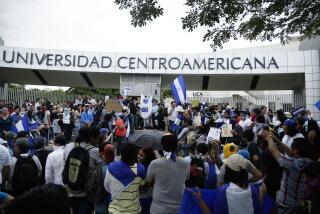Will Gorbachev Show Good Faith and Restrain Nicaragua?
Forty years ago, at the strident beginning of the Cold War, it used to be said that every congressional action on foreign affairs had two tallies--the actual number on Capitol Hill and then the way the vote was counted in Moscow. And so it was, in a sense, again this week as the House rejected the latest Administration proposal for further military aid to the Nicaraguan Contras.
By its defeat of Contra aid, Congress not only rebuffed Ronald Reagan; it also called the diplomatic hand of Soviet leader Mikhail S. Gorbachev, who has more than once offered to pressure and even pacify his Sandinista clients if only the United States would stop arming the Contras. How the Soviets now respond to the House vote will be crucial to far more than peace in Central America, if only because Gorbachev’s good faith there is likely to be seen as a first litmus test of his reliability on the whole range of strategic and regional issues crowding the agenda of the planned Moscow summit meeting later this year. The stakes are high, and the task will not be easy.
Gorbachev is discovering, as some scarred American politicians before him have, that client states can be the special curse and burden of a great power. There may have been a time when the Soviets saw the Nicaraguan revolution as something to be exploited and controlled for their own purposes--what U.S. conservatives call a beachhead in the Americas. But the opportunity has been overtaken by events. Now the Soviets are learning that it is easier to scavenge the social revolutions of the Third World, to arm and entice some cat’s-paw against the United States, than to unload and somehow still influence the same regime when it has become a diplomatic liability.
There is no mistaking the arithmetic of Soviet influence on Nicaragua. Moscow’s combined economic and military aid to Managua runs nearly $1.5 billion a year--the principal support for a beleaguered Sandinista government facing 40% unemployment, 1,000% inflation and the prospect of continued economic warfare with the United States, if not some new onslaught from the Contras should the peace process break down. Only the Soviets can make possible the 600,000-man reserve army and those coveted MIGs to calm the real and imagined fears of President Daniel Ortega and his regime. Without substantial Soviet help, and as long as the United States quarantine continues, the Sandinistas can neither win the war nor secure the peace.
Yet, for all that, the Nicaraguans have proved to be typically troublesome proxies, proudly and fiercely nationalistic and very much aware of how fickle the Russians can be as patrons of revolution. So while Comandante Ortega has made impressive diplomatic concessions to the Arias peace plan (and to the U.S. congressional vote), the Managua regime has also quietly tightened the screws of internal control and repression with a resurgence of political prosecutions and government-instigated vigilantes. It will take much of Gorbachev’s charm and statesmanship, and some firm financial pressures, to wring from Ortega & Co. both the diplomatic and the domestic compromises on which peace and the Contra aid cutoff depend.
Then, too, the Soviets will have their own “linkage” problems in responding to the House vote--the perils of pulling back in Central America while seeming to retreat in other areas as well. Gorbachev must now restrain the Sandinistas while withdrawing gracefully from Afghanistan, edging delicately toward some detente with the Chinese, preserving his option in the detonating turmoil in Israel’s occupied territories, all the while keeping the revolutionary and strategic face in Angola, South Africa and other volatile and tempting outposts. All of these are bargaining chips with his own formidable rivals in the Kremlin as well as with the unpredictable Americans, and all of them will have some effect on how far the Soviets will feel they can go in Nicaragua.
Not least, there is the subtle interdependence between Soviet foreign and domestic policy, an obscure yet real connection between the bloody little war in Central America and the fate of Gorbachev’s historic experiment of perestroika . Diplomatic triumphs and reduced tensions abroad clearly fortify Gorbachev personally. A major settlement with the United States would mean a long-term respite and rejuvenation of the Soviet economy. Yet the final verdict on perestroika will be decided at home, in the bureaucratic and industrial labyrinth where Soviet reformers are trying to shake a corrupt, sclerotic system back to life with painfully limited resources. In the new austerity and managerial upheaval that is in store for the Soviet Union in 1988, it will not be easy for Moscow to find the political energy or the money and goods that it will cost to buy its way out of those misty jungles along the Nicaraguan-Honduran border.
If he can now summon the statesmanship--and the luck--Gorbachev will find the rewards opened by the House vote as real as the risks. It is not only that a genuine peace in Central America will pave the path for the Moscow summit and make all but politically inevitable a further U.S.-Soviet agreement on strategic-arms control. A constructive Soviet role in Nicaragua also could open the way to Moscow’s participation in larger regional security negotiations in Latin America and elsewhere. For Gorbachev as for Reagan, this could be the beginning of some real diplomacy, beyond their rhetoric, to curb and eventually to eliminate the senseless and costly U.S.-Soviet rivalries in the Third World--confrontations that neither side wants nor wins in the end.
More to Read
Sign up for Essential California
The most important California stories and recommendations in your inbox every morning.
You may occasionally receive promotional content from the Los Angeles Times.










